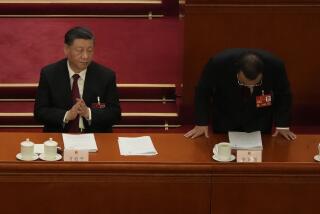China Limits Reforms to Marketplace : Politics: Dictatorship remains ‘essential,’ premier says. Address to Parliament reflects new confidence of leaders.
- Share via
BEIJING — Premier Li Peng, speaking Monday at the annual session of China’s rubber-stamp Parliament, said that market reforms will be pushed forward but that Beijing will continue to view political liberalization as a threat to stability and development.
Dictatorship by the Communist Party remains “essential,” he told the 2,898 delegates at the opening session of the National People’s Congress in the Great Hall of the People.
Li delivered an upbeat but sober assessment of progress in China’s economic modernization drive. The generally moderate speech, largely free of the shrill ideological rhetoric that has been his trademark, reflected a new-found self-confidence among China’s top leaders that they have ridden out the domestic and international political storms of recent years.
The premier aimed a tough blast of criticism, however, at Hong Kong Gov. Chris Patten for proposing to implement limited electoral reforms in the British colony before it reverts to Chinese sovereignty in 1997. His words contributed to a 5.1% plunge in the Hong Kong stock market index.
Li endorsed an upward revision to 8% or 9% in China’s planned rate of annual economic growth for the next five years. He noted that a longstanding goal of quadrupling 1980 gross national product by the year 2000 seems likely to be achieved at least two years early.
“We should never lose sight of the central task of economic development,” Li said. “In handling a series of complicated internal and external questions over the past five years, the party and the government have always kept economic development at the center of their concerns.”
Li clearly meant to justify the 1989 crackdown on the Tian An Men Square pro-democracy protests as having restored the social order needed for continued economic growth. He also was apparently referring to recent policies such as pursuit of friendly relations with all China’s neighbors, regardless of ideological considerations.
“Social and political stability is the basic prerequisite for smooth progress in reform, opening up and modernization,” Li declared. “We should treasure the present political stability and unity, which have not been easily achieved.”
Li’s harshest language was aimed at Patten, whose reform proposals would broaden voter participation in the colony’s 1995 legislative elections. The plan was officially published Friday, in a first step toward making it law, after a breakdown of British attempts to open negotiations with Beijing on the proposal.
“Last October, the governor of Hong Kong, with the support of the British government, perfidiously and unilaterally proposed a program for major changes in the current political system in the territory,” Li declared. “The action . . . is designed to create disorder and to impede the smooth transfer of power.”
In a departure from the prepared text distributed to reporters, Li went on to declare: “Now, the British side has created new obstacles for Sino-British cooperation on the issue of Hong Kong. The British government shall be held exclusively responsible for all serious consequences arising from its latest action.”
The Hong Kong stock market, still reacting to Friday’s news that China was refusing to negotiate over the reforms, plunged 6.1% in the first 15 minutes of trading Monday, then partially rebounded to close the morning session down 4.5%. It drifted lower in afternoon trading, as investors pondered Li’s comments, to close at 5,854.61, down 5.1% for the day. The market had hit a series of all-time highs earlier this month on the strength of strong corporate earnings and optimism that Britain and China might settle their dispute.
Most of Li’s speech was devoted to a recitation of achievements, policies and problems in China’s economic and governmental work.
China’s 1992 economic growth of 12.8% has produced something approaching euphoria among some foreign investors and analysts. Li noted with pride that the economy has grown at an average pace of 7.9% for the last five years.
More to Read
Sign up for Essential California
The most important California stories and recommendations in your inbox every morning.
You may occasionally receive promotional content from the Los Angeles Times.













